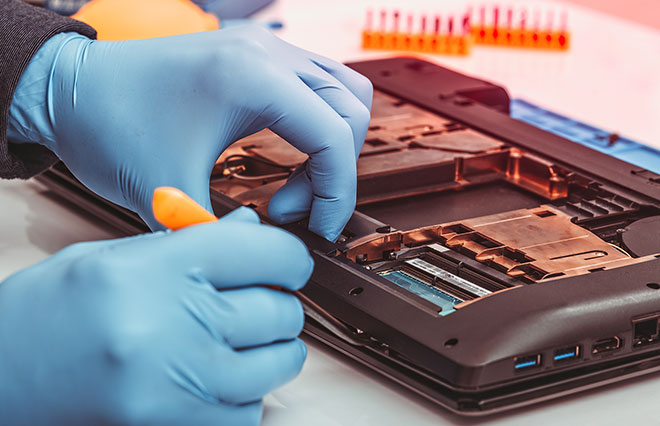Sometimes the concept of a circular economy is better explained with a real-life example so we’d like to share another client case study. When it comes to device reuse, TEKrefresh are committed to an innovative approach that maximises the value of our clients’ assets and guarantees a long and happy second life for the technology. Reflecting on our internal sustainability processes gave us the opportunity to consider the impact of our collective corporate and individual actions on reducing e-waste.
- Device reuse extends the lifecycle of resources
It’s always a great feeling knowing that we’ve maximised the resale value of IT hardware. It’s that little bit more special when we do it for a cash strapped charity with ever present funding challenges. One of the biggest benefits of the dual facets of our organisation – expert IT support for mobile technology and professional recycling and resale of old hardware – is that with many of our clients we are with them every step of the way.
In this case study our charity client had over 1000 laptops that were more than 5 years old but still of value in the market. It was really important that the resale value was maximised as this was pivotal in creating a viable budget for the new laptops they needed. So how exactly did we go about getting our client the best possible resale price?
The first step goes way back to when we started supporting this particular mobile workforce. A strategic and consistent device management plan deployed during first life, ensures that assets stay in the best possible condition for their age ready for their eventual resale.
We upgraded the operating systems without any impact on the processing speed making the devices much more appealing to potential new owners.
We graded the devices and separated out the Grade D machines - these have no resale value due to significant damage such as a dead motherboard. We then extracted the recyclable components such as screens, touch pads, keyboards and plastic casings, creating a sustainable and low-cost resource of spare parts. We then used these parts to repair and increase the resale value of the higher-grade machines.
Following our rigorous internal assessment an impressive 86% of these laptops were graded at either Grade A or Grade B. Knowing for sure that these machines were in such great condition meant we could offer our client an upfront payment so they could proceed with the purchase of new hardware without waiting for the units to be sold. Another win-win scenario for everyone – maximum resale value for our client and approximately 1500 kg less electronic waste going to landfill.
- We can all play our part
Clearly companies like TEKrefresh are not the only ones focussing on technology reuse, component recycling and wider sustainability issues. It’s all too easy for e-waste to be framed as a post-consumer problem. This issue encompasses every stage of the production and lifecycle of devices so the solution must do the same. Designers, manufacturers, investors, traders, miners, raw material producers, consumers, policy makers and others all have a crucial role to play. We need to reduce waste, retain value within the circular economy, give electronic items multiple lives and insist that devices can be easily repaired, reused and recycled before we buy them.
- A new way of looking at things
The prevailing “take, make and dispose” economic model has many negative consequences for our society, health and the environment. A completely changed and shared vision for the production and consumption of electronic devices is needed - a new economic system that functions more appropriately to meet today’s global challenges. In order to effectively service electronics supply chains, the efficient use of scarce materials, investment in recycling infrastructures and technologies and scaling up the volume and quality of recycled materials must all be considered. The right policy mix combined with effective sector management will lead to the creation of millions of high value jobs across the world.
- Early adopters will win big
This is an historical tipping point and represents a genuinely unprecedented opportunity for international businesses, policymakers and workers worldwide to effect positive and lasting change. Those companies that harness the undeniable commercial value of e-waste and action change now will secure an incredible economic advantage. A more innovative approach to the development of electronic products and services more suited to a circular economy will deliver less e-waste and more profit.
